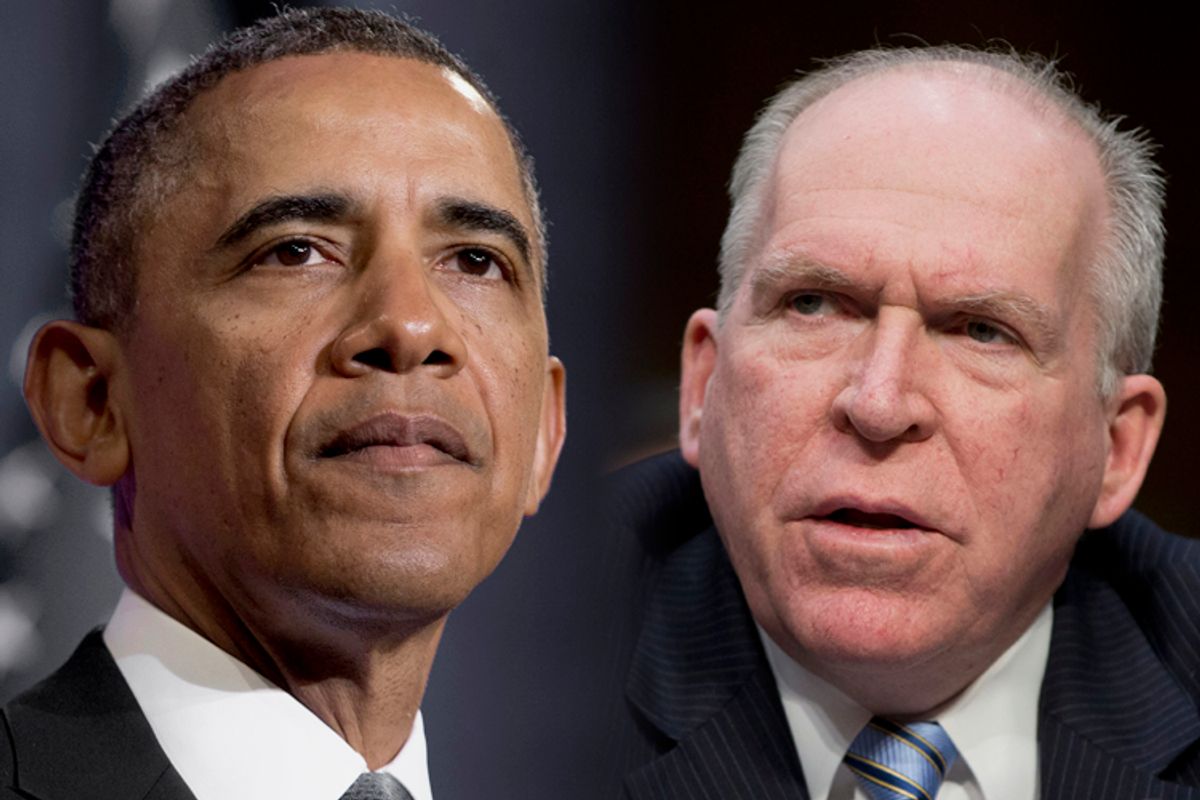One of the most troubling realities of the CIA’s years-long torture program is that no one involved in its creation botched or implementation has faced any consequences, and no one is likely to for the foreseeable future. From the higher-ups who fractured the law to authorize the program, to the people on the ground who so badly managed it – they’re all getting a pass despite the mountains of evidence pointing to criminal activities, gross negligence, and cover-ups of some of the worst behaviors.
The New York Times, in a justifiably strident editorial written in response to the Senate Intelligence Committee’s report on the brutal and ineffective interrogation program, calls for accountability for the torturers in the form of criminal prosecutions. “No amount of legal pretzel logic can justify the behavior detailed in the report,” the Times editorial board writes. “Indeed, it is impossible to read it and conclude that no one can be held accountable. At the very least, Mr. Obama needs to authorize a full and independent criminal investigation.”
That would indeed be something. Unfortunately, that idea (along with several other less stringent proposals) was already considered and thrown out by President Obama. The Washington Post reported earlier this month on the various options the Obama team considered in the early days of his presidency for handling the torture issue – a “truth and reconciliation commission,” a “Pentagon-style after-action report, similar to the 9/11 Commission,” etc. – and how the president rejected each and every one. “Obama wanted to avoid distracting and divisive criminal prosecutions or hearings,” the Post noted. “He believed any inquiry of his would look like an attack on his predecessor, President George W. Bush, and dispel any hope of bringing a bipartisan spirit to government. And he feared that the intelligence services, whose career rank-and-file members had followed guidelines handed down from above, would feel they had been abandoned by a new administration.”
Maybe the Times is hoping that Obama, in the last half of his last term as president, is feeling less constrained by the political considerations that stayed his hand early on, but that doesn’t seem likely, at least not as it pertains to issues of national security.
The truth of the matter is that the national security apparatus operates under different standards for accountability. Politicians tasked with oversight of agencies like the CIA are also highly sensitive to the political nature of their work, and take great pains to avoid being seen as attacking the people tasked with safeguarding national security. Thus, you have a paradoxical situation in which someone doing the important, high-stakes work of national security has far greater leeway to screw up and break the rules.
Just this past weekend, the Times reported on the findings of the panel charged with investigating an incident in which the CIA improperly accessed computers used by Senate staffers compiling the Intelligence Committee’s report. After CIA director John Brennan denied that any such incident had occurred, the CIA copped to snooping earlier this year after the agency’s inspector general found that “CIA officers read the emails of the Senate investigators and sent a criminal referral to the Justice Department based on false information.” A five-member panel was convened (by Brennan) to look into the matter and figure out what should be done. According to the Times, the panel “will recommend against punishing anyone involved in the episode.” The CIA officials involved in the incident, the Times notes, “staunchly defended their actions, saying that they were lawful and in some cases done at the behest of John O. Brennan.”
So consider what has happened here. The CIA broke into computers being used by the congressional committee tasked with its oversight and read investigators’ emails. After the Senate complained, the director of the CIA denied everything up and down. After that was proven to be false, the CIA apologized and the director appointed a committee to investigate. That hand-picked committee is now recommending against any disciplinary action because the people involved say they didn’t break the law and were following orders from the agency director (who, remember, denied this had happened).
Up to this point, the White House has insisted that it has full confidence in Brennan. He hasn’t done anything to merit this confidence, but he and most everyone else at the CIA get away with this stuff because typical standards of accountability just don’t apply to them. This is the dispiriting reality that stands in stark contrast to the Times editorial board’s call for prosecutions of the torture masterminds. They shouldn’t get away with it, but they’re protected by a political culture that will bend over backwards to shield the intelligence community from any real accountability for its actions.



Shares